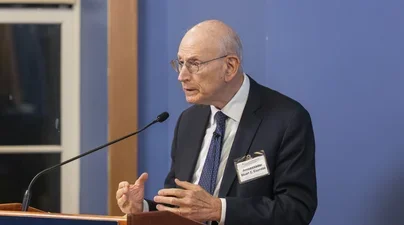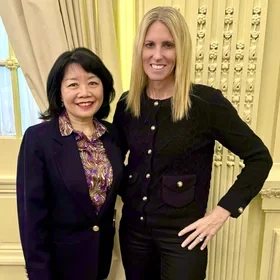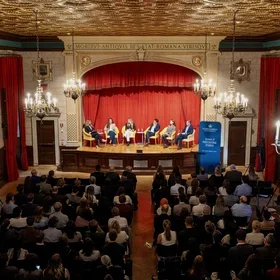On October 8 at Columbia’s Faculty House, Ambassador Stuart Eizenstat shared key takeaways from his new book, The Art of Diplomacy, and recounted highlights from his esteemed career as a diplomat. From personal anecdotes of late-night pizza with foreign diplomats to negotiation strategies used at Camp David, Eizenstat drew back the curtain on the life of an ambassador.
Hosted by the Columbia School of Professional Studies (SPS) M.S. in Negotiation and Conflict Resolution (NECR) program, the evening included an engaging conversation with Eizenstat, a book signing, and an audience Q&A session. Dr. Beth Fisher-Yoshida, program director of the Negotiation and Conflict Resolution program, moderated the event.
Throughout his life of service, Ambassador Eizenstat held multiple senior positions across three U.S. administrations. He served as chief White House domestic policy advisor during the Carter administration and was U.S. ambassador to the European Union, Deputy Secretary of the Treasury, and Under Secretary of State for Economic, Business, and Agricultural Affairs during the Clinton administration. In 2013, Eizenstat was appointed Special Advisor for Holocaust Issues during the Obama administration, a position he retains to this day.
Earlier this year, Ambassador Eizenstat released his book The Art of Diplomacy: How American Negotiators Reached Historic Agreements That Changed the World. With a wealth of experience in American diplomacy, Ambassador Eizenstat offers masterful insights into diplomatic history and the critical international agreements of the past half century.

Ambassador Stuart Eizenstat addresses the audience at Columbia University's Faculty House.
“At a time of great turbulence, when we face seemingly insoluble problems,” Eizenstat said, “I wanted to demonstrate how, over the past 50 years, we have reached agreements on equally difficult issues and can do it again, with diplomacy.”
As his book title suggests, Ambassador Eizenstat views diplomacy as an art that requires solutions to overcome stonewalling and prevent conflict. “Properly used,” he noted, “diplomacy is a tremendously positive force to avoid the worst instincts of people, which is to shoot before you think.”
With many personal anecdotes and historical examples, the ambassador reflected on the highs and lows of international negotiation and emphasized how each case informs our response to current and future conflicts.
Discussing the present Israeli military operations in Gaza, Ambassador Eizenstat reiterated the necessity of an international agreement between Israel and the neighboring powers. “[Security] cannot be achieved only with military means,” he said. “... For the Arab states, there must be some solution to the Palestinian issue, which the current [Israeli] government is not willing to do.”
As is true historically, he explained, this conflict will require a willingness to negotiate compromises from multiple sides. Similarly, it will not be resolved overnight. Instead, it will involve a progression of small-scale agreements that will encourage peace in the region.

Ambassador Stuart Eizenstat and NECR Program Director Dr. Beth Fisher-Yoshida answer audience questions.
“Don’t swing for home runs in your negotiations, because you’ll often strike out,” Eizenstat urged. “Go for limited agreements, singles, that you can build on. If you try to go for too much, you’ll get nothing.”
Following his presentation was a Q&A session, which offered guests the opportunity to ask the ambassador about his career, current events, and diplomacy. Much of the audience was made up of Columbia's Negotiation and Conflict Resolution students as well as learners and scholars from across the university, eager to ask Eizenstat about his experience working on international treaties such as the 1997 Kyoto Protocol. The event concluded with a lively reception, where guests mingled and Ambassador Eizenstat resumed his book signing and chatted with attendees.
As guests left the event, they carried with them a new understanding of diplomacy, inspired to pursue continued conversation and engagement with the field.
Click below to view a video recording of the full event:
About the Program
Columbia University’s Master of Science in Negotiation and Conflict Resolution prepares students to analyze the root causes and dynamics of conflict and to transform disputes through reasoned and resourceful interventions. The program focuses on developing self-awareness, tenacity, and interpersonal competency; building common ground; opening lines of communication; ensuring representation and recognition; and building sustainable possibilities for resolution.



